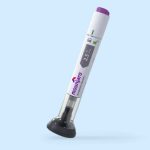Learn what NAD+ is, how it functions in the body, and how this essential molecule may play a role in supporting your energy, metabolism, and overall cellular function—powered by TryTrimi.
Key takeaways
- NAD+ (nicotinamide adenine dinucleotide) is a coenzyme found in every human cell.
- It may support important cellular activities like energy production and repair.
- Levels of NAD+ can naturally decrease with age, stress, and lack of sleep.
- NAD+ injections are one method individuals explore for wellness support with professional guidance.
What is NAD+ and Why Is It Important?
NAD+ is a vital molecule naturally found in every living cell. It’s considered a “coenzyme,” or a helper molecule that allows enzymes to carry out important processes—especially those tied to energy production and cellular restoration.
You can think of NAD+ as an essential player in keeping your body’s cells functioning smoothly. It may help support your body’s ability to convert nutrients into usable energy and maintain internal balance.
However, NAD+ levels naturally start to decline as we age. For many, this begins in their 30s, leading to changes in energy, focus, and how we feel day-to-day.
How NAD+ Supports the Body
NAD+ plays a key role in various biological functions:
- Helps convert nutrients (like fats and carbs) into usable energy (ATP)
- Supports DNA repair and cellular recovery
- Aids metabolism and mitochondrial function
- Influences circadian rhythm and stress response
In simple terms, NAD+ acts like a connector—activating enzymes that keep your body working efficiently. But as we age or experience stress, our natural NAD+ production may slow down.
That’s why NAD+ has become a major topic in wellness, longevity, and biohacking spaces.
Signs Your NAD+ Levels May Be Dropping
Although you can’t test NAD+ levels easily at home, some signs may suggest your body could benefit from NAD+ support:
- Low energy or fatigue
- Difficulty concentrating or staying mentally sharp
- Slower recovery from workouts or physical stress
- Feeling rundown during times of high stress
These symptoms aren’t definitive diagnoses, but they often prompt individuals—especially women 30+—to ask about NAD+ injections or supplements.
Signs Your NAD+ Levels May Be Dropping
Although you can’t test NAD+ levels easily at home, some signs may suggest your body could benefit from NAD+ support:
- Low energy or fatigue
- Difficulty concentrating or staying mentally sharp
- Slower recovery from workouts or physical stress
- Feeling rundown during times of high stress
These symptoms aren’t definitive diagnoses, but they often prompt individuals—especially women 30+—to ask about NAD+ injections or supplements.
Curious about NAD+ injections?
Take our 2-minute quiz to see if you’re eligible to speak with a provider.
NAD+ Injections vs Other Support Methods
NAD+ can be supported in a few ways:
- Dietary changes (foods high in B vitamins)
- Exercise and intermittent fasting, which may help preserve natural levels
- Over-the-counter supplements with NAD+ precursors like Nicotinamide riboside (NR) and nicotinamide mononucleotide (NMN), meaning they are compounds the body may convert into NAD+ as part of its natural metabolic process.
- Prescription NAD+ injections, available through clinician-guided care are sometimes used in wellness routines to support cellular energy and recovery.
Each method has its own benefits. However, if you want better absorption or more reliable results, NAD+ injections may be worth discussing with a medical provider.
Ready to learn more about NAD+ therapy?
Get started online—no commitment required.
Final Thoughts
If you’ve been feeling low on energy or looking to support your body’s natural resilience, NAD+ could be a conversation worth having with your provider.
NAD+ doesn’t promise miracles, but it plays a central role in how your cells function. By understanding what NAD+ does and how it changes over time, you can make better choices about supporting your wellness from the inside out.
Disclaimer: The FDA does not approve compounded medications for safety, quality, or manufacturing. Prescriptions and a medical evaluation are required for certain products. The information provided on this blog is for general informational purposes only. It is not intended as a substitute for professional advice from a qualified healthcare professional and should not be relied upon as personal health advice. The information contained in this blog is not meant to diagnose, treat, cure, or prevent any disease. Readers are advised to consult with a qualified healthcare professional for any medical concerns, including side effects. Use of this blog’s information is at your own risk. The blog owner is not responsible for any adverse effects or consequences resulting from the use of any suggestions or information provided in this blog.
Eden is not a medical provider or a pharmacy. Eden connects individuals with independent licensed healthcare providers who independently evaluate each patient to determine whether a prescription treatment program is appropriate. All prescriptions are written at the sole discretion of the licensed provider. Medications are filled by independent, state-licensed pharmacies. Eden does not manufacture, own, or dispense any medications. Please consult a licensed healthcare provider before making any medical decisions.
In recent years, personalized weight loss treatments have garnered significant attention for their ability to provide tailored solutions that cater to individual needs. One such treatment that has shown remarkable promise is compounded Semaglutide. Originally developed for managing type 2 diabetes, Semaglutide has been repurposed for weight loss due to its ability to effectively regulate appetite and promote substantial weight reduction. This comprehensive guide delves into the benefits of compounded Semaglutide and how it can aid in achieving your weight loss goals.
What is Compounded Semaglutide?
Compounded Semaglutide is a customized formulation of the medication Semaglutide, tailored to meet the specific needs of an individual patient. Semaglutide works by mimicking the GLP-1 hormone, which plays a crucial role in regulating appetite and blood sugar levels. Compounding refers to the process of creating a personalized dosage and formulation of the medication, ensuring that it is optimized for the patient’s unique health profile and weight loss requirements. This personalized approach not only enhances the effectiveness of the treatment but also minimizes potential side effects.
The Science Behind Semaglutide
Semaglutide is part of a class of medications known as GLP-1 receptor agonists. These medications work by mimicking the GLP-1 hormone, which is naturally produced in the gut and helps regulate appetite, insulin secretion, and blood sugar levels. By activating GLP-1 receptors in the brain, Semaglutide helps reduce hunger and increase feelings of fullness, leading to reduced calorie intake and weight loss. Clinical studies have shown that Semaglutide can lead to significant weight loss, making it a valuable tool for individuals struggling with obesity and weight management issues.
Benefits of Using Compounded Semaglutide
- Personalized Dosage and Formulation: One of the primary benefits of compounded Semaglutide is the ability to customize the dosage and formulation to meet the specific needs of the patient. This personalized approach ensures that the medication is highly effective and well-tolerated.
- Reduced Risk of Side Effects: By tailoring the dosage to the individual, compounded Semaglutide minimizes the risk of side effects that can occur with standard, one-size-fits-all dosages. This personalized approach ensures a safer treatment experience.
- Enhanced Effectiveness: Compounded Semaglutide has been shown to be more effective in reducing appetite and promoting weight loss compared to standard formulations. This is due to the precise customization of the medication to suit the patient’s unique metabolic needs.
- Long-Term Benefits for Metabolic Health: In addition to promoting weight loss, compounded Semaglutide can improve overall metabolic health by regulating blood sugar levels and reducing the risk of obesity-related conditions such as type 2 diabetes and cardiovascular disease.
The Trimi Approach to Weight Loss
Try Trimi offers a unique approach to weight loss by incorporating compounded Semaglutide into its personalized treatment plans. The process begins with a comprehensive health assessment, which includes a detailed online quiz and a virtual consultation with a licensed healthcare provider. Based on this assessment, a customized treatment plan is developed, which includes a prescription for compounded Semaglutide. Trimi’s approach ensures that each patient receives a treatment plan that is tailored to their specific needs, maximizing the effectiveness of the medication and enhancing the overall weight loss experience.
Success Stories and Testimonials
Many individuals have experienced significant weight loss and improved health with the help of compounded Semaglutide and Trimi’s personalized approach. Success stories highlight the convenience and effectiveness of the treatment, with patients reporting substantial weight loss and improved quality of life. Testimonials from satisfied clients emphasize the benefits of personalized care and continuous support from Trimi’s medical team, which plays a crucial role in maintaining motivation and achieving long-term weight loss goals.
Getting Started with Compounded Semaglutide
Starting your weight loss journey with compounded Semaglutide through Try Trimi is a straightforward and user-friendly process:
- Health Assessment: Begin by completing an online health assessment to provide insights into your medical history and weight loss goals.
- Consultation: Engage in a virtual consultation with a healthcare provider to discuss your health needs and determine the suitability of compounded Semaglutide.
- Personalized Treatment Plan: Receive a customized treatment plan that includes a prescription for compounded Semaglutide, tailored to your specific needs.
- Medication Delivery: Enjoy the convenience of having your medication delivered directly to your doorstep, ensuring a hassle-free experience.
- Ongoing Support: Benefit from continuous support and regular check-ins with medical professionals to monitor your progress and make necessary adjustments to your treatment plan.
Conclusion
Compounded Semaglutide offers a highly effective and personalized solution for weight loss, providing significant benefits over standard treatments. By tailoring the medication to meet individual needs, patients can achieve substantial weight loss and improve their overall metabolic health. Try Trimi’s innovative approach to weight loss, which includes personalized treatment plans, convenient online consultations, and continuous support, makes it an ideal choice for those seeking a sustainable and effective weight loss solution. Start your journey with Try Trimi today and experience the transformative benefits of compounded Semaglutide.





